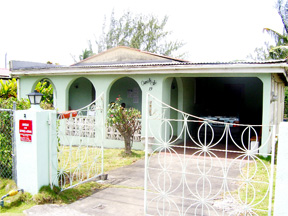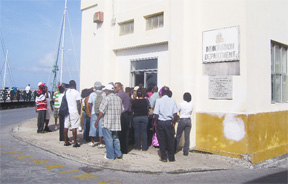The David Thompson administration in Barbados on May 5 made public a new immigration policy to deal with the issue of undocumented Caricom nationals who will have to fit certain criteria or be “removed” come December 1 this year.

Guyana’s Honorary Consul to Barbados Norman Faria during his exclusive interview with this newspaper at his office on Tuesday acknowledged that many Guyanese were being taken advantage of by con artists.
“I fear that some intermediaries and lawyers here are trying to get money from the poor Guyanese here,” Faria said
He said he has had to give advice on several situations in which Guyanese felt that they were at a disadvantage or deliberately being taken advantage of.
“I have had to listen in cases for instance, when Guyanese are not being paid for long times and then the employers get immigration to get them out so they won’t have to pay,” he said.

Faria told Stabroek News too that with the announcement of the new policy some attorneys have purported to be in a position to help Guyanese meet requirements to be able to get themselves regularized knowing fully well that they don’t meet the criteria.
“Some unscrupulous lawyers telling the people they could get status for them and some charge as much as US$1,000 for nothing because they can’t help,” he added.
One Guyanese woman who wished to remain anonymous and who only minutes before speaking with this newspaper found out her fate, admitted to not qualifying for regularisation under the new policy.
“I have been here for seven years and I have no documents but I have a place I rent with my sister and a friend and together we pay our bills every month. Back home all I worked for was to pay my rent and bills. Many times I couldn’t enjoy the simple pleasures. Now I have to return to this. I hope that the President seeing and hearing our concerns and address it so we could come home and at least be comfortable,” she said.
The woman said she was fully aware that the money she earned for her hard work was far less than what a Barbadian would be paid for the same job. She was hesitant in disclosing her type of job.
“The Bajans won’t do wha I do for my money and because of that they pay us next to nothing. But I have two children home and they depending on me,” she said.
Another woman who laughingly suggested that the way to get by was to adopt the Barbadian dialect said though her employers tried to be good to her, she knew she was being badly underpaid and deductions were made from her salary each month because of the charges which they could face if found to have an illegal immigrant in their employ.
“So I just stay out of trouble cause despite what I going through here, I still living better than if I went in Guyana. It really rough,” she said.
She insisted that there was a certain set of Guyanese involved in bribing Barbadian immigration officers as well as paying their way through any difficulties.
“And what these people doing is using your mattie Guyanese to get at you, so Guyanese snitching on one another,” she said.
She wouldn’t say whether she qualified under the new policy, but repeatedly insisted that she was “going home just now.”
What was common in these interviews was the fact that most of them agreed that the Barbadian government was acting in its own interest as well as what was best for its people.
One woman recounted the promises made by Thompson during the elections campaign.
“I had a feeling that he would have done this as soon as he was elected. But the thing is, I believe that these people took a careful look at their immigration records so that they would have known the time period to apply for this thing and knew fully well that only few Guyanese would qualify because many of us who were here before got our papers when [Owen] Arthur was in,” she said.
“I agree with what they want to do but they could at least spare some of us who keeping out of problems with the law and here for at least five years because if they don’t they will also feel this,” one man insisted.
He works at a resort as a handyman. He emphasized that most of the persons did smaller jobs, which were also essential to the upkeep of businesses like resorts and hotels.
“The employers in the country should speak out cause they save money too by employing illegals like me. I work with sheer Vincentians and [St] Lucians and we work hard, even harder that their own people. They employ us for that and they know that whenever they need us we will come and never one day stay home from work. So I feel they should keep some noise and let this government consider again wha they really doing,” he said.
One woman who spoke freely on her flight back home to Guyana on Wednesday said she was laid off and even without the new policy she was prepared to return home.
“I had planned to come home so this don’t really affect me. But I feel it for my brothers and sisters who really look forward to send money home to their families. We government got to step up and have less talk and more work. They got to do something before the pressure gets to everyone,” she said.
She worked at a hotel which had cut staff in Barbados.
Another woman said she blamed both the PPP and the PNC for “the mess” the country is in.
“We country gone to the dogs but we could do better and it’s because of this, make these people got to treat we like this. I blame them,” she said, not prepared to say whether she was undocumented or qualified under the new policy.
Many of the Guyanese recounted hearing of small raids by the immigration department on those persons who are more easily identified as Guyanese. This newspaper was also made to understand that on Fridays many Guyanese, after receiving their wages, commune at a spot in Bridgetown and so were easily recognised by immigration officers who would sometimes round them up and arrange for their return home.
The immigration office in Bridgetown was on Wednesday morning packed with persons curious to get their business done.
Only few among them were those who were looking after their Barbadian passports. The department which deals with permits, extensions and the other services which non-nationals would require was filled as persons queued and collected numbers and awaited their turn.
A stern looking immigration officer, neatly attired in his blue trousers and light blue shirt stood firm as he directed the steady flow of persons.
Four of those persons with whom this newspaper spoke briefly, and were easily identified as Guyanese, said they were there to collect extended permits.
At the Grantley Adams airport on Wednesday there were no obvious signs of Guyanese encountering problems with immigration officers or being placed on benches. What was noticeable however was many Guyanese with large bags much to the airlines’ disappointment.
Many of them were made to pay fees for their extra bags which came home safe and sound.
Faria has already diagnosed that very few Guyanese would qualify under the amnesty being offered by the Barbados Government to undocumented Caricom nationals, according to Guyana’s representative on the aisle.
The new immigration policy has already come into effect and as of June 1 those persons residing and working there for eight years prior to December 31, 2005 may have a chance once they meet criteria already set out and agreed to by a cabinet committee on immigration.





